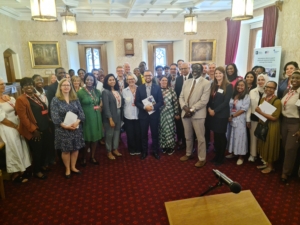Raising the profile of the Midlands as a region
The Midlands has much to offer in the economic development of the UK. It’s a rich and diverse region, with a population of over 11 million, a long history as the heart of the UK’s manufacturing, and a higher export economy than anywhere else in the country. Despite this, it can often be overshadowed by conversations surrounding the North-South divide. Through their support and development of research and innovation across the region, Midlands Innovation (MI) seeks to raise the profile of the Midlands on the UK’s national stage.
In navigating regional collaborations across institutions, a key challenge is in understanding who does what and where. There are thousands of academics working across the Midlands’ higher education institutions; knowing who to contact regarding a research collaboration can prove difficult. By facilitating communication and collaboration across its partner institutions, MI is helping institutions to navigate this challenge, which in turn helps to foster and develop exciting developments in research and innovation.
Adding value to funding bids through communication
Speaking with Dr Ian Hancox (University of Warwick) on how MI adds value to its partners, a clear benefit is through their communication and contacts. Discussing the work done towards putting forward proposals such as MI TALENT, a project aimed at advancing the role of technicians in academic institutions, or bids for capital equipment, Hancox notes two key points in which having support from MI can help bids to be successful:
- Buy-in from the Vice-Chancellors at their partner institutions through communications with their executive board team.
- Buy-in and support from the research communities at each institution who can see the shared value of an institution in the region receiving the funding – e.g. funding for equipment that can then be shared via the equipment database.
In the case of MI TALENT, having buy-in from the Vice-Chancellors and the partners meant that there was a clear case of support and commitment across the institutions to promote and develop the careers of their technicians. Letters of support are impactful because they can demonstrate that the funding will be wide-reaching as it will benefit multiple institutions.
By facilitating communication across their networks, the Vice-Chancellors, and the relevant funders, MI can help to strengthen the power of a funding bid by showcasing its collaborative potential through the support of partner institutions.
Adding value to research through collaboration
Speaking with Professor Davide Calebiro (University of Birmingham), he discussed how working with MI can add value to research collaborations. In a remote meeting with MI during the pandemic, Calebiro recalls colleagues considering how laboratories could become more resilient in the face of global challenges. Following these conversations, a research bid was put forward by MI partners Birmingham, Leicester, Nottingham, and Warwick. The partnership received a £1 million grant from Biotechnology and Biological Sciences Research Council (BBSRC). Through the grant, two key goals were achieved:
- The development of the Midlands Open Bioimaging Network.
- The development of new technologies in the form of an autonomous, remote-controllable microscope.
Calebiro notes that there is often a trade-off in the capabilities of microscope technologies. They are often either capable of automatic analysis and can therefore output a high number of data, but the images are low resolution, or they can generate high resolution images but must be manually operated and so the output of data is far lower. Through the progress and developments made by the network regarding advanced microscopy, they have produced a microscope that can be controlled remotely, can produce high resolution images, and can do so on a large scale.
In addition to being an exciting technological advancement, Calebiro notes that developing this technology has also helped to improve the accessibility of training and research. Remote access has helped to remove barriers, such as the cost of travel and providing access for researchers at institutions that do not have this equipment. The democratisation of facilities via equipment sharing means that more researchers can access vital technology and have more opportunities to collaborate.
MI’s work in facilitating communication and collaboration has helped to increase access to equipment, foster the sharing of best practice, and encourage collaborations that can help to advance technological developments. Through their facilitation of communication and collaboration, MI continues to add value to research communities across the Midlands.







